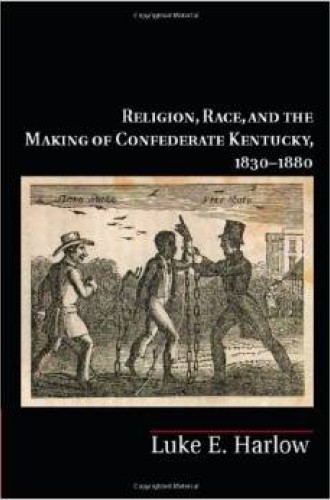Religion, Race, and the Making of Confederate Kentucky, 1830-1880, by Luke E. Harlow and The Problem of Slavery in the Age of Emancipation, by David Brion Davis
During the tumultuous 1860s, N. G. Markham did his best to live a Christian life. Away from his Michigan home, he spent his days and nights in Tennessee as a soldier in the Union army. He wrote frequently to his wife, Eunice, of his camp experiences, battlefield struggles, and the faith he tried to maintain. “We have the funniest Sundays I ever saw,” he reported in September 1862. “Some are writing, some singing, some reading their testaments, some cleaning their guns, and some are asleep and some are cursing and swearing.”
More than a year later, both the war and Markham had changed. The Emancipation Proclamation had transformed the “war for the Union” into a war for universal abolition, and the fighting had become more ferocious on all sides. Markham was glad to have a wife who prayed for him. “I have faith to believe that your prayers will be answered,” he wrote. “Keep on praying for it is good to feel when we are in danger.”
Read our latest issue or browse back issues.
When it came to the lives of African Americans and the end of slavery, however, he neither offered prayer nor encouraged anyone else to pray. “I am not half so much of an abolitionist as I was before I came here,” Markham explained in the same letter. “The free niggers here [are] the most lazy lot of fellows that I ever saw. I would not turn my hand over to see the whole of them free.”
One year later, Markham once again reflected on how different his life had become. He now worked alongside free black men in his military company. At first he wanted nothing to do with a “nigger regiment.” As an enlistee, however, Markham didn’t get to make those kinds of choices. When black men entered his company, he had two options. He could lift hands with them or he could be court-martialed. So he worked with them, and eventually he began spending some of his social time with them. “I am learning a Negro here in our Company to read,” he wrote to Eunice. “He learns very fast.” Three months later, Markham died of a camp disease.
As a white Christian living and dying in the great moment of emancipation, Markham both road and reflected on the roller coaster of his times. He longed for the Lord’s favor and protection, and he viewed African Americans in the aggregate, rather than as individuals. At one point he deemed them unworthy of human or heavenly aid. Even when he taught a black man to read, Markham didn’t mention the man’s name or anything else about him. At least in the letter, the man was simply “a Negro here in our Company.”
Scholars have spent decades trying to understand the N. G. Markhams of the United States. How could northern whites, who seemed to care so little for African Americans, fight, kill, and die for mass emancipation? How did these whites come to support a limited set of rights for blacks during the era of Reconstruction, but then abandon them in the 1870s and do little to stop the racial violence of the 1880s and beyond?
Two new books, one from a junior scholar and the other from a senior one, shed important new light on these questions. Luke E. Harlow’s Religion, Race, and the Making of Confederate Kentucky uses the anomaly of Kentucky to explain the much broader phenomenon of white Christian racism and its attachment to political conservatism. Harlow begins with a problem: How did a slaveholding state remain within the Union during the war but then join the Confederacy theologically after its defeat? For Harlow, the answer rests in the tangled webs of religion, slavery, and race.
Through close readings of sermons, denominational newspapers, treatises, and tracts, Harlow shows that before the Civil War, white Kentuckians waged an intense battle over slavery and abolition. Three camps emerged. The smallest pushed for immediate emancipation; the largest suggested gradual emancipation coupled with colonization, or sending blacks to live outside the United States; a third group found no problem with slavery and wished it to continue. An uneasy coalition emerged among gradualists and proslavery Kentuckians, and they aligned both in religious denominations and in the state’s politics. At the center of this alliance was the belief that immediate abolition was a Christian heresy that had the power to disrupt the state’s and the nation’s political stability.
White Kentuckians split their loyalties when the war came, but the state remained within the Union. During the first year of the conflict, leading white Christians endorsed the Union, in large part because of their commitment to political stability. Emancipation, however, drastically altered the playing field. The possibility of gradual abolition was nullified. Emancipation had not only come swiftly, it had brought with it the arming of black men in the Union military. This was horrifying to many white Christians, who viewed it as the triumph of “Northern Apostasy.” Only a “Satanic School” of politicians and preachers could have concocted such a wicked plan, claimed one leading voice of Kentucky Presbyterianism.
When the war ended and emancipation became the law of the land, white Kentuckians shifted their loyalties to the Confederacy, which lived on as an ethos even though it was dead as a nation-state. In Harlow’s telling, the Confederacy was also a theology that wove together religion, politics, and race. The tenets of this racial religion were quite simple: white supremacy was godly; any interference with it, political or religious, was heretical and therefore should be attacked politically and religiously. Confederate Kentucky was made by this racial religion.
While Harlow zeroes in on slavery, emancipation, and race in a single state, David Brion Davis zooms out to provide a panorama of the broad Atlantic world. The Problem of Slavery in the Age of Emancipation is the final installment of Davis’s trilogy on slavery in Western culture. The first two books analyzed the problem of slavery in the West from the age of antiquity to the convulsions of 18th-century revolutions. This new volume explores how emancipation overcame slavery from the Haitian Revolution to the American Civil War. The fundamental problem, according to Davis, was articulated by Thomas Jefferson in his Notes on the State of Virginia: “What further is to be done with these people?”
The Haitian Revolution not only began the age of emancipation, it haunted it. Throughout the Atlantic world, political leaders feared what would happen after slavery. They read reports of murder and mayhem in Haiti and feared that emancipation would unleash barbaric and angry blacks who would seize whites’ lands and bodies. Slaveholders attempted to domesticate slaves as they had cattle and horses, but they could never achieve it to their satisfaction. The slaveholders were never able to dehumanize humans. This combination—the horrors of Haiti and the failure to create perfectly compliant slaves—left white leaders searching for a solution.
For most white leaders, the colonization of free blacks was the answer, at least rhetorically. From Jefferson to Lincoln, many politicians considered it the necessary addendum to emancipation, and some African Americans volunteered to leave the United States. Colonization schemes were diverse not only in their plans, but also in their underlying ideologies. Some proponents observed commercial possibilities; others viewed colonization as another Exodus. After its founding in 1820, Liberia became the focal point for hopes that colonization could solve the problem of emancipation in the age of slavery. In all cases, however, colonization became fraught with the same problems of colonial settlement that marked other territories, including the United States of the same era.
The heroes of The Problem of Slavery in the Age of Emancipation are free blacks, whose presence in the western American territories caused the Civil War and made mass emancipation possible. Free blacks recognized that their achievements and actions were being judged and that they needed to lead virtuous lives to convince white Americans to at least nominally support their freedom. According to Davis, they convinced an important group of whites that plans for colonization were an expression of white supremacy.
Davis and Harlow add considerably to scholarly thinking about slavery, emancipation, politics, race, and religion. They force us to see how these problems were tied together and that to address one of them was to somehow address them all.
But they are focused mostly on scribblers and speakers. Both Harlow and Davis emphasize 19th-century problems as ideological ones, and neither looks closely at the nitty-gritty of life—which is troubling, especially in the case of Davis’s book. By emphasizing free blacks as the central characters of the saga, Davis privileges those who achieved broader freedom and the capacity to write or to have their words recorded for posterity. The more than 3 million Americans who remained in bondage were crucial as well, but because they largely failed to leave written accounts of their ideas, they are largely written out of this account.
Moreover, by emphasizing the ideological, Harlow and Davis fail to reckon with the problems of race and religion that go beyond what people say or write. What people do and fail to do, what they own and fail to own, and what they share and fail to share offer windows into the past as well. This is certainly the case with Markham. His Christian individualism and his statements against free blacks fit within the Christian white supremacist ideology of his age. But what was he doing reading with an African American man, a fellow soldier in his company? If we look between the lines, we may see two men sharing Bibles as they did rifles. We may feel handshakes after a church service or glimpse looks of gratitude in the midst of battle. The powers of white supremacy have been and are great. But they have never been total, even in the life of N. G. Markham.
If recent events in Ferguson, Missouri, and elsewhere have taught us little else, it is that the United States is anything but finished with its struggles over race. The legacies of slavery are still with us, and they include the assumption that whiteness is somehow close to godliness. Works like Harlow’s and Davis’s give us food for thought at a time when we need more sustenance to keep fighting and hoping that God will make right, for might has failed to do so.








